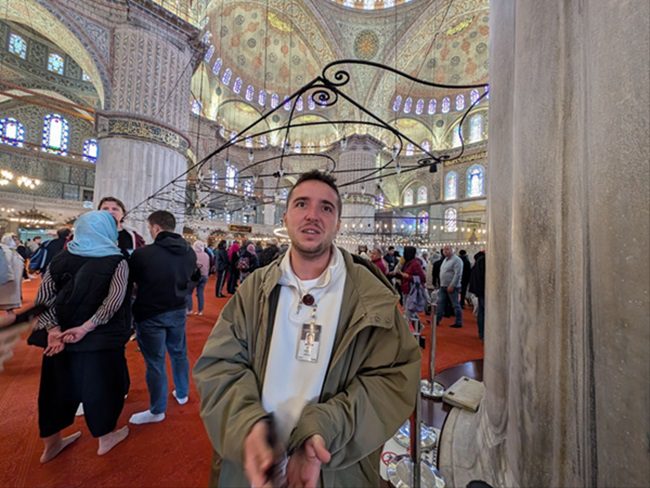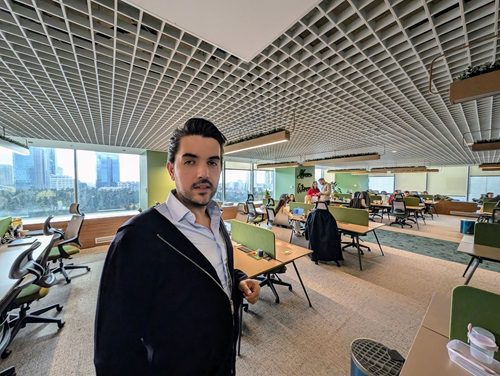 While many tourists in Istanbul marvel at the Hagia Sophia or explore the Grand Bazaar, Mark Pollard had a different kind of souvenir in mind: a fuller head of hair.
While many tourists in Istanbul marvel at the Hagia Sophia or explore the Grand Bazaar, Mark Pollard had a different kind of souvenir in mind: a fuller head of hair.
“Istanbul is incredible, it’s like a museum,” says Pollard, an author and public speaker from Washington, D.C. “But it also has a reputation for having some of the best hair transplant clinics in the world. So I decided to get one while I was doing some work in Bulgaria and Georgia last year.”
In addition to his procedure, Pollard walked around the city and tried the famous Turkish restaurants, caught a soccer game, took a ferry to Moda, and made friends with some of the locals.
He’s part of a wave of medical tourists flocking to Turkey, transforming the country into a global healthcare destination. But how do you balance surgery with sightseeing? As this trend accelerates, that’s what more visitors to Istanbul have been trying to do — and it’s not always easy.
Why is medical tourism booming in Turkey?
There are three main reasons why people are flocking to Turkey for medical treatment.
- It has quality healthcare and a strong healthcare infrastructure, with 1,518 hospitals and a Healthcare Access and Quality Index score of 74.4 out of 100.
- It’s inexpensive for U.S. visitors. Healthcare costs are dramatically lower than in the U.S. For instance, a hair transplant that costs up to $12,500 in the U.S. starts at around $2,120 in Turkey. “It’s one of the main reasons Turkey has established itself as a top destination for medical tourism,” says Alma Miftari, a spokeswoman for SchengenVisaInfo.com.
- It’s one of the world’s great tourist destinations. Touring Istanbul’s attractions, from the Blue Mosque to the Grand Bazaar, should be on everyone’s bucket list. That’s why many medical tourists combine sightseeing with their medical treatment.
How many people are going to Turkey for medical treatment?
Turkey has experienced a surge in medical tourism, with visitor numbers soaring from 670,730 in 2021 to 1.8 million in 2023, according to the Turkish Statistical Institute. The most common types of medical procedures sought in Turkey include hair transplantation (50 percent), ophthalmology (18 percent), cosmetic surgeries (15 percent), and dental treatments (15 percent).
Americans, in particular, favour Turkey for medical tourism. New data by HomeToGo indicates visitors are staying in Turkey longer than visitors to other destinations—an average of 12 to 19 days. That suggests people are extending their trips for medical tourism purposes.
Murat Alsaç, a co-founder of EsteNove, the hair transplant clinic that Pollard used, says the pandemic marked a turning point for medical tourism in Turkey. Before 2020, most patients came from nearby regions like Europe and the Middle East. However, border closures and travel restrictions during the pandemic prompted Turkish medical tourism companies to look for new markets.
“This led to a significant influx of American patients, who now constitute over 50 percent of our clientele,” he says.
Alsaç estimates that the American market doubles every year.

Erdim Barbaros, a tour guide in Istanbul, shows visitors around the Blue Mosque. Photo by Christopher Elliott.
Pro tips for planning a medical trip
When considering medical treatment in Turkey, Alsaç emphasizes careful research and due diligence in selecting the right clinic. Here are his recommendations:
Prioritize doctor expertise. Thoroughly research the qualifications and experience of the doctor who will perform the procedure. In Turkey, hair transplant doctors gain significant knowledge because of the high patient volume. A doctor with a long career might have treated over 10,000 patients, minimizing potential complications.
Verify the clinic’s credentials, accreditations, and online reviews. Look for medical facilities with high ratings on platforms like Trustpilot and examine before-and-after photos from previous patients. Forums and social media can also offer insights into patient experiences.
Don’t focus solely on price. While affordability is significant in medical tourism, avoid choosing a clinic exclusively based on the lowest price. A significantly cheaper option might indicate compromises on quality, potentially leading to subpar results or complications.
Consider patient selection. A reputable clinic will honestly assess your suitability for the procedure and advise against it if you’re not a viable candidate. For example, a successful hair transplant depends on factors such as donor hair density and the size of the area requiring treatment.
Alsaç also says the quality operators in Turkey will take care of you from when you arrive until you’re dropped off at the terminal. For example, a clinic like EsteNove includes airport pick-ups, luxury hotel accommodations, and ground transportation. It also provides patients with an interpreter to ensure no questions are unanswered.
Tips for balancing surgery and sightseeing
Turkey is a fascinating place, even if you’re Turkish. But it’s also a case study for accommodating your curiosity and visiting a clinic.
Ask your medical provider for a recommendation.
Your medical practitioner may be able to offer guidance about your proposed procedure. “Make a list of questions to ask your healthcare provider,” says Raymond Yorke, a spokesman for Redpoint Resolutions. “This will help ensure you have a clear understanding of what to expect and how to balance both care and sightseeing effectively.”
Remember: You’ll need time to recover.
You’re better off doing strenuous activities like hiking before your procedure, says Michael Sheridan, a visiting associate professor at Temple University Japan. Then, build in enough time after your procedure to recover and do some lighter activities before flying home. “After a treatment, many visitors need a few days to relax,” he adds. “It’s important to pay attention to how you feel — nobody wants to push themselves too hard.”
You can still enjoy a destination after surgery.
Chances are, you won’t leave the country right away because of a follow-up appointment. While recuperating, you can engage in light tourism activities. Mady Dudley, who works for a marketing agency in St. Petersburg, Fla., recently visited Istanbul for Botox treatments. But after her session, she wasn’t allowed to sweat, be in the sun or bend down for at least 24 hours. “Luckily, there is so much delicious food in Istanbul so though we missed sight-seeing that day, we were able to experience the amazing culture through cuisine,” she says.
Timing is everything
Perhaps the most effective way to balance medical treatment with tourism in Turkey is to manage stress levels. After all, getting any medical treatment can be anxiety-inducing. (No wonder the clinics hand out Xanax like it’s candy — just the sight of needles is enough to set some people’s hearts racing.)
Erdim Barbaros, an Istanbul tour guide, recommends visiting Turkey during the off-season, from November to early March.
“That way, you’ll avoid crowds and potential risks associated with crowded tourist attractions,” he says.
He also advises scheduling tours in the afternoons, mainly after 3 p.m., when the old town becomes less crowded. While walking tours of the old city in Istanbul are a favourite, he says food tours and boat tours of the Bosphorus are worth considering, especially if you’re trying to relax. You’ll also get to see another side of the historic city.
Barbaros says the alternative, coming to Istanbul during high season, can test your patience. During busy times, it is not uncommon to wait up to an hour to get into popular sites like the Basilica Cistern or the Hagia Sophia.
Don’t overplan your medical trip.
Pollard, who had a hair transplant at EsteNove in Istanbul, says he learned much about being a practical medical tourist.
“My advice would be, don’t overplan the first two to three days after your surgery,” he says. You may have to return to the clinic for a follow-up visit. Also, you might need extra sleep to recover, and you might be on some medications that make you drowsy — so take it easy.
But after that, his advice is to explore.
“Don’t be scared to go out,” he says. “Nobody cares that you’ve just had surgery. You might even strike up a conversation with people because you’ve had surgery like they have.”
Many men who come to Turkey for hair transplants want to isolate themselves in their hotel rooms. But Pollard discovered a brotherhood of the bandaged—a group of men who had just experienced hair transplants and were eager to share their recovery stories.
“They were very supportive,” he adds.
As for his transplant, Pollard says he’s over the moon almost a year after his surgery. He even created an Instagram account to share his hair journey with friends and family.
“I’m happy, and I feel more confident,” he says.
Written by: Christopher Elliott
BIO:
Christopher Elliott is an author, consumer advocate, and journalist. He founded Elliott Advocacy, a nonprofit organization that helps solve consumer problems. He publishes Elliott Confidential, a travel newsletter, and the Elliott Report, a news site about customer service. His latest book is The Unauthorized Travel Manual. If you need help with a consumer problem, you can reach him through his nonprofit site or email him at chris@elliott.org.





















Why would anybody travel to Turkie, with its political unrest and questionable alliances, when Thailand offers an excellent level expertise and is so much more convenient to Australia.